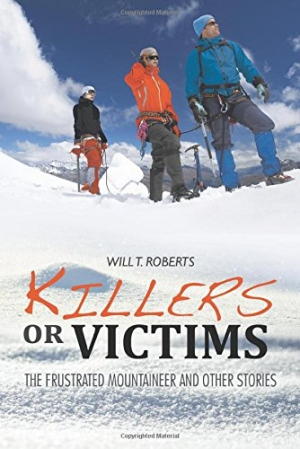Killers or Victims
The Frustrated Mountaineer and Other Stories
These macabre stories impart the unsettling thought that anyone might become a killer—even you.
Will T. Roberts’s dark collection of short stories, Killers or Victims, follows a series of protagonists through Freudian inner conflicts of id versus ego, where they all commit morbid acts in attempts to quiet animalistic impulses.
The stories in this collection commit to a common theme: characters are victims of their own weaknesses, lacking in agency and will, or overwhelmed by materialistic desires and intense sexual urges. Their inability to exercise control leads to their final undoing.
The first adventure, of Jack Slingo in “The Frustrated Mountaineer,” provides the basic formula for each of the seven stories that follow. Characters have obsessions that lead to shocking moments of desperation, including instances of incest, necrophilia, and many creative solutions to hiding a corpse.
Although the disturbing acts committed by the protagonists are unexpected within the stories, the actors themselves seem emotionally removed, even callous, once their urges have been satisfied. Thwarted desires are presented as the primary motivations for vicious acts, though characters are not teased out well enough to make those desires sympathetic.
Characters speak with a straightforward diction that emphasizes their emotional detachment from their victims. Frequent sex scenes are more clinical than erotic, though the mechanical tone increases the tension, emphasizing the psychopathic nature of the protagonists: “He considered raping Marlene’s dead body but he could not get an erection even though he looked closely at Marlene’s breasts and vagina.”
Subheadings within each story separate stages of the protagonists’ deepening trouble like acts in a play by indicating shifts in the narrative action: Present Situation, Action, The Threat, and Discovery are all marked. Summaries provide the protagonists’ motivations at the end of each story, concluding, “because of that [s]he became a killer.” Thus, there is little ambiguity over the dichotomy proposed by the title; as unwitting victims of their own ids, the characters kill—they are not killer or victim, but both.
The narrator focuses on telling rather than showing, which can disallow the stories to speak for themselves. However, physical descriptions, particularly those of a sexual nature, provide vivid movements without the need to know what the bodies really look, or feel, or smell like. The dialogue moves quickly, as it is frequently rendered through indirect speech.
For those fascinated by the deviant and macabre, this collection of stories is a worthy read full of shocking plot twists. Narratives are unpredictable and fast-paced, and impart the unsettling feeling that anyone could become a killer—a devoted priest, an innocent receptionist, maybe even you.
Reviewed by
Amanda Catherine Atkinson
Disclosure: This article is not an endorsement, but a review. The publisher of this book provided free copies of the book and paid a small fee to have their book reviewed by a professional reviewer. Foreword Reviews and Clarion Reviews make no guarantee that the publisher will receive a positive review. Foreword Magazine, Inc. is disclosing this in accordance with the Federal Trade Commission’s 16 CFR, Part 255.

